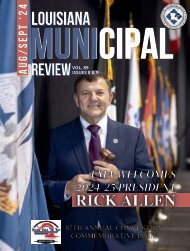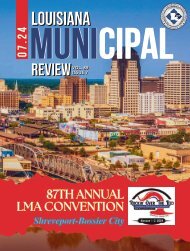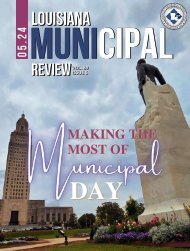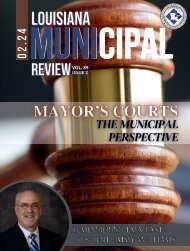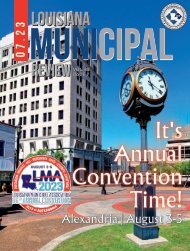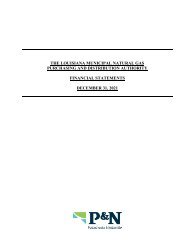Create successful ePaper yourself
Turn your PDF publications into a flip-book with our unique Google optimized e-Paper software.
Guard who owned and last occupied such property who are killed in<br />
action, or who are missing in action or are a prisoner of war for a period<br />
exceeding ninety days; or 4) any person or persons permanently totally<br />
disabled as determined by a final non-appealable judgment of a court<br />
or as certified by a state or federal administrative agency charged with<br />
the responsibility for making determinations regarding disability.<br />
Proposed Constitutional Amendment retains present constitution<br />
and provides that a trust shall be eligible for the special assessment<br />
level if the trust would have been eligible for the special assessment<br />
level prior to the most recent reappraisal, the total assessment of the<br />
property held in trust shall be the assessed value on the last appraisal<br />
before the reappraisal.<br />
Present Constitution provides an additional exemption from ad valorem<br />
taxation of seven thousand five hundred dollars of the assessed valuation<br />
of property receiving the homestead exemption that is owned<br />
and occupied by a veteran with a service- connected disability rating of<br />
one hundred percent unemployability or totally disabled by the United<br />
States Department of Veterans Affairs or the surviving spouse of the<br />
veteran.<br />
Proposed Constitutional Amendment retains present constitution<br />
and provides an additional exemption for a trust.<br />
Present Constitution provides that for ad valorem taxes due in 2017<br />
and thereafter, an unmarried surviving spouse of a person who died<br />
while on active duty as a member of the armed forces of the United<br />
States or the Louisiana National Guard, or while performing their duties<br />
as a state police officer, or a law enforcement or fire protection officer<br />
who qualified for the salary supplement authorized by Article VII, Section10(D)(3)<br />
of this constitution is entitled to an exemption from ad valorem tax for<br />
the total assessed value of their homestead.<br />
Proposed Constitutional Amendment retains present constitution<br />
and provides an additional exemption for a trust.<br />
6. “Do you support an amendment that will require that any<br />
reappraisal of the value of residential property by more than<br />
50%, resulting in a corresponding increase in property taxes, be<br />
phased-in over the course of four years during which time no additional<br />
reappraisal can occur and that the decrease in the total<br />
ad valorem tax collected as a result of the phase-in of assessed<br />
valuation be absorbed by the taxing authority and not allocated<br />
to the other taxpayers?”<br />
Act 718 (<strong>2018</strong> Regular Session) amends Article VII, Section 18(A) and (F).<br />
Present Constitution provides that property subject to ad valorem<br />
taxation shall be listed on the assessment rolls at its assessed valuation<br />
which shall be a percentage of its fair market value and all property<br />
subject to taxation shall be reappraised and valued at intervals of not<br />
more than four years.<br />
Proposed Constitutional Amendment retains present constitution<br />
and provides for the phase-in of additional tax liability in the year of implementation<br />
of a reappraisal resulting from the increase in the property’s<br />
assessed value over a four-year period, if the assessed value of the<br />
immovable property increases by an amount which is greater than fifty<br />
percent of the property’s assessed value in the previous year as follows:<br />
a) For the first levy following reappraisal, the collector shall use the<br />
property’s assessed value from the previous year, which is called the<br />
base amount, and shall increase the portion of the assessed value of<br />
the property used to calculate ad valorem taxes by adding an amount<br />
which is equal to one-fourth of the amount of the increase in the<br />
assessed value as a result of the reappraisal to the base amount, and<br />
the resulting amount shall be the property’s taxable value and shall be<br />
used solely for purposes of calculating ad valorem taxes for that taxable<br />
year.<br />
b) For the second levy following reappraisal, the collector shall increase<br />
the portion of the assessed value of the property used to calculate<br />
ad valorem taxes by adding an amount which is equal to one-half<br />
of the amount of the increase in the assessed value as a result of the<br />
reappraisal to the base amount, and the resulting amount shall be the<br />
property’s taxable value and shall be used solely for purposes of calculating<br />
ad valorem taxes for that taxable year.<br />
c) For the third levy following reappraisal, the collector shall<br />
increase the portion of the assessed value of the property used to<br />
calculate ad valorem taxes by adding an amount which is equal to<br />
three-quarters of the amount of the increase in the assessed value as a<br />
result of the reappraisal to the base amount, and the resulting amount<br />
shall be the<br />
property’s taxable value and shall be used solely for purposes of calculating<br />
ad valorem taxes for that taxable year.<br />
d) For the fourth levy following reappraisal, the collector shall calculate<br />
ad valorem taxes based on the property’s full assessed value.<br />
Proposed Constitutional Amendment provides that the phase-in of<br />
additional ad valorem tax liability following reappraisal shall cease to<br />
apply on the transfer or conveyance of ownership of the property, and<br />
the collector shall calculate ad valorem taxes based on the property’s<br />
full assessed value after the transfer or conveyance.<br />
Proposed Constitutional Amendment provides that property subject<br />
to the four-year phase-in of additional ad valorem taxes shall not be<br />
subject to reappraisal by an assessor until after the four-year phase-in<br />
of the amount of the increase in the property’s assessed value is complete.<br />
Proposed Constitutional Amendment provides that notwithstanding<br />
any provision of this constitution to the contrary, the increase in<br />
assessed valuation of property phased- in shall be included as taxable<br />
property for purposes of subsequent reappraisals and valuation for<br />
millage adjustment purposes under Article VII, Section 23(B) of this<br />
constitution, and the decrease in the total amount of ad valorem tax<br />
collected by a taxing authority as a result of the phase-in of the assessed<br />
valuation shall be absorbed by the taxing authority and shall<br />
not create any additional tax liability for other taxpayers in the taxing<br />
district as a result of any subsequent reappraisal and valuation or millage<br />
adjustment.<br />
Proposed Constitutional Amendment further provides that the implementation<br />
of the phase-in of increase in assessed valuation shall neither<br />
trigger nor be cause for a reappraisal of property or an adjustment<br />
of millages pursuant to Article VII, Section 23(B) of this constitution.<br />
Proposed Constitutional Amendment shall not apply to the extent<br />
the increase was attributable to construction on or improvements to<br />
the property.<br />
Page 22<br />
<strong>LMR</strong> | <strong>October</strong> <strong>2018</strong>



